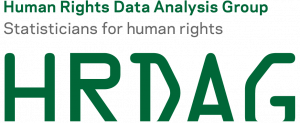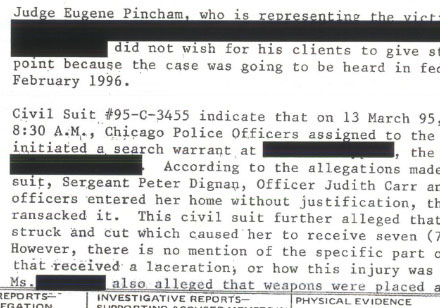2020 YEAR IN REVIEW
Beyond statistics:
Readiness in the face
of uncertainty
Ready and relentless
At HRDAG, we are responding to a period of incessant uncertainty and chaos with readiness, focus and determination. Experience has taught us to remain relentless in the pursuit of undeniable truth — and so, we are. Statistics deliver insight, and our insights pave the way to clarity, accountability and ultimately, justice.
We know that perpetrators of human rights violations create false narratives, hiding evidence of crimes by distorting data, creating gaps. We illuminate those gaps. We know that science can confuse the public when vital data on pandemic risk and safety is unclear. We clarify the facts and explain the science. We know that justice seeking truth commissions require reliable evidence of undocumented deaths and abuses. We calculate what’s missing — and provide the scientific evidence.
We start with what is known, determine what is missing, and provide what is desperately needed: clear answers to urgent questions in the midst of uncertainty. We are equally relentless in preparing for our next challenge. We innovate new statistical methods, monitor world events, and initiate dialogues with prospective partner organizations. When an opening appears, we move rapidly to organize, preserve and protect relevant data. We achieve our goal when legitimate questions of fact yield to informed demands for justice and accountability.
At HRDAG, we are passionate about data and relentless in the pursuit of a better future.
2020: Urgent questions
How widespread – and deadly – is police violence? The question took on new urgency this year during worldwide protests of police brutality. Progress, long-hindered by incomplete reporting, seemed newly possible.
But first, the public needed the facts.
HRDAG statisticians Patrick Ball and Kristian Lum tackled one underlying question in 2015: How many people in the US have been killed by police, including undocumented homicides? Using statistical estimation, we calculated: nearly 10,000 Americans over an 8-year period.
In 2019, newly-available data created an opportunity for us to analyze police misconduct more broadly. Following a multi-year battle, our partners at the Invisible Institute gained access to records of citizen complaints against police in Chicago. We worked with them to design and maintain a data pipeline to process enormous “data dumps” of hundreds of thousands of documents. These complaints typically contain large blocks of text, which make quantitative analysis challenging, but not impossible. Our combined efforts are linking formal complaints to individual officers, making it possible to quantify the number and types of complaints-per-officer.
The result? The most accurate, comprehensive picture yet of police misconduct in Chicago.
That is only the beginning.
We anticipate a substantial influx of new data on police behavior in response to lawsuits, legislation, and formal requests. New York State just repealed a section of its legal code, thereby making police misconduct records more accessible. California is strengthening legislation to make information about police use of force publicly available. More and more records of this type are going to become available in the months and years to come.
Alongside our partners, we will be ready to uncover the truth — bringing facts into sharp focus, and demands for justice and reform to the forefront.
Life, death and probabilities
How reliable are Covid-19 test results? In the chaos of a worldwide pandemic, fueled by the spread of misinformation, we all feel an urgent need for accurate, understandable information. The appearance of scientific uncertainty feeds public confusion — hindering individual decision-making, and rippling out in invisible waves of community impact. How can HRDAG help? We bring clarity to the uncertainty.
First, we focus on asking the right question: How many people are infected? Public health departments can only measure how many people receive a positive test result, which is not the same thing. Raw tallies of diagnosed infections reflect some combination of the number of infections in the population, the rate of testing in the population, and the proportion of infections that cause symptoms. Nothing in these variables holds constant from city-to-city or state-to-state.
Test results are also difficult to interpret on an individual level. A positive result does not prove sickness; nor does a negative one ensure health. But, a specific mathematical equation, called Bayes Theorem, helps explain both results.
Consider screening tests looking for SARS-CoV-2 proteins or antibodies (potential indicators of a past infection, but not a current one). What does a positive test result indicate? What is the likelihood that it is correct and accurately recognizes antibodies? Answering these questions requires knowledge of the test (its “sensitivity” and “specificity”) AND the infection rate within a community. Counterintuitively, the lower the infection rate in the community, the higher the odds that a positive test is incorrect. Our team unpacked all the math in an essay in Granta magazine in April 2020.
While the implications for public policy are debated nationwide, our essay sidesteps the politics to provide a valuable public service: equipping individuals to interpret their own test results accurately, and make informed personal decisions.
And finally, justice
What does justice require? Countries managing the transition from injustice-in-conflict to accountability-in-peace require data to determine patterns of violence, assess culpability, and prescribe justice. We have a long history of contributing to these transitions; Patrick Ball’s 2015 testimony in the trial of Chad's former president Hissène Habré is just one recent example.
This year, we are in the midst of advising two projects in countries as they end long civil wars. The sensitive process necessitates discretion; we cannot identify our partners currently. While our role is straightforward — we clarify questions, analyze data, provide reliably precise answers, and (when necessary) testify to them — the transitional justice efforts are complicated and long-term. This is often the case. Our analyses cited by the judges when they found Habré guilty of crimes against humanity were decades in the making.
We may not know yet the specific outcomes of our current international projects. But we do know that inaccurate statistics can damage the credibility of human rights claims — and that is why we strive to ensure that statistics about human rights violations are generated with as much scientific rigor as possible. The evidence we produce for our partners is just that: evidence. Documented in its methodologies, conclusive in its results, sufficient for courtrooms and the press. Ready for delivery at those pivotal moments when what seemed impossible becomes possible: resolution and accountability.
HRDAG is relentless in our pursuit of human rights and seeking justice around the world. This work is at the foundation of who we are. As we witness funding for and attention to such critical work shrinking, we remain passionately committed to partnering with truth commissions and international peace processes in the years to come.
HRDAG by the numbers
A three year summary
| HRDAG’s fiscal year is July 1–June 30 | 2019–20 | 2018–19 | 2017–18 |
| Beginning cash balance | 527,801 | 213,428 | 102,145 |
| Income | |||
| Foundation grants | 955,452 | 1,386,971 | 981,186 |
| Revenue from contracts | 10,700 | 22,474 | 90,812 |
| Direct public support | 95,968 | 89,555 | 35,043 |
| Total income | 1,062,120 | 1,499,00 | 1,107,041 |
| Expenses | |||
| Salaries and consultants | 1,073,492 | 946,281 | 787,618 |
| Travel and conferences | 16,468 | 34,350 | 44,358 |
| Rent, utilities, and technology | 36,359 | 47,745 | 42,438 |
| Supplies and other direct costs | 28,411 | 19,892 | 23,083 |
| Administration ¹ | 95,608 | 136,359 | 98,260 |
| Total expenses | 1,250,338 | 1,184,627 | 995,757 |
| Ending cash balance ² | 339,583 | 527,801 | 213,428 |
The people behind hrdag
HRDAG’s team includes Executive Director Megan Price, Director of Research Patrick Ball, Data Scientist Tarak Shah, Statistician Maria Gargiulo, Foundation Relations and Strategy Lead Kristen Yawitz, Operations Coordinator Suzanne Nathans, as well consultants, interns, and fellows. Our team is based in San Francisco, and our partners are located in countries around the world. We are supported by an advisory board composed of Julie Broome, Margot Gerritsen, Michael Bear Kleinman, and Dinah PoKempner.
2020 is more than statistics
The central tenet of HRDAG’s work is a deep-seated commitment to justice,
accountability, and truth. Every year, the pursuit of these fundamental
principles becomes more fraught and more necessary. This past year was no
exception with extraordinary challenges posed by the Covid-19 pandemic,
widespread worldwide protests due to police violence, and the very concept of
evidence-based science being questioned by so many people
 around the world. The times are both unprecedented and
uncertain.
around the world. The times are both unprecedented and
uncertain.
In the midst of this uncertainty, I am proud to say that
my colleagues and I at HRDAG have been steadily and
systematically doing the work we do best — using statistics to advance
international human rights and justice. As data scientists in the field we
created nearly 30 years ago, we continue our critical work with extraordinary
focus and commitment. We are profoundly grateful to our loyal and generous
supporters for sharing our belief in rigorous scientific methods and dedication
to human rights and justice.

Megan Price
Executive Director
WE THANK THIS YEAR’S GENEROUS SUPPORTERS
- Anne R. Dow Family
Foundation - Cooper Schneier Fund
of The Minneapolis
Foundation - Keller Family
Foundation - John Ahlquist
- Joy Lian Alferness
- Russel Almond
- Stuart Ambler
- Anonymous
- Agrima Bahl
- Kevin Bales
- David Banks
- Carol Bebko
- Ann-Marie Benz and
- Jim Wheaton
- James Bergman
- James Bircher
- Rafael Brent
- Theresa Brocchini
- Julie Broome
- Katherine Brumberg
- George Chamales
- Audrey Chapman
- Cindy Cohn and
- Patrick Ball
- Maeve Condon
- Anne-Marie Cowsill and
- Jeremy Shaw
- Katherine Crecelius
- Christian Davenport
- Cory Doctorow
- Dan Dumitriu
- Patrick Dzioba
- Paul Fontes
- Arnoldo Frigessi
- Jim Fruchterman
- Benjamin Gardon
- Margot Gerristen
- Mark Girouard
- MJ Golin
- Mary Gray
- Christine Grillo
- Oli Hall
- Jessica Hamrick
- Megan Henderson
- Susan Holmes
- Adee Horn
- Nicholas Horton
- Josh Jelin
- Max Kaehn
- Rafe Kaplan
- Karen Kim
- Reid Kleckner
- Michael Bear Kleinman
- Joey Kotfica
- Barbara Kroft
- Jan Larres
- Mallory Lass
- Ami Laws
- Saori Masuda
- Lachlan Musicman
- Suzanne Nathans
- Alex Novet
- Chris Palmer
- Victor Pappalardo
- David Peters
- Allie Petrina
- Dinah PoKempner and
- Robert Kushen
- Nada Rayyes
- Geetha Reddy and
- Matthew Brocchini
- Anu and D. Raj Reddy
- Winifred Reilly
- Margaret Rosequist
- Frank Schulenburg
- Softy Schuyler
- Ethan Siller
- Gurpreet Singh
- Caitlin Sislin
- Paul Spinrad
- Jesse Storbeck
- Rick Storrs
- Hayley Umayam
- Lance Waller
- Rachel Weintraub and
- Allston James
- Catherine Zennström
- GitHub for Good
- Google Matching Gifts
- Microsoft Corporation
- Matching Gifts
We provide analysis so that our partners — human rights advocates — can build scientifically defensible, evidence-based arguments. Our work has been used by truth commissions, international criminal tribunals, and non-governmental human rights organizations on five continents. As always, we welcome support from those who share our desire for justice.
HRDAG gratefully acknowledges our major funders for their support of data science for good.

Cover image based on a photo by Kemal Cellat, modified by David Peters.




